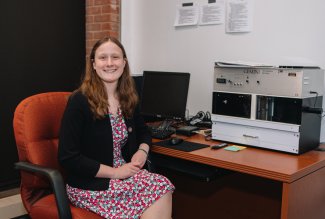
Ohio Northern University junior Claire Miller, who is majoring in psychology with a concentration in behavioral neuroscience, has been selected as a 2023 Goldwater Scholar.
Miller is one of 413 college students across the United States selected by the federally endowed Barry Goldwater Scholarship and Excellence in Education Foundation to receive this premier undergraduate award that honors outstanding academic work in the fields of mathematics, the natural sciences and engineering. Awardees were selected through a partnership with the Department of Defense and the National Defense Education Programs (NDEP).
The Foundation, named after the late U.S. senator and military veteran Barry Goldwater, has awarded a total of 10,283 scholarships since 1989. This year, an estimated 5,000 sophomores and juniors were nominated by 427 academic institutions. Many of the scholars have published their research in leading professional journals, have presented their work at professional society conferences and have garnered the attention of prestigious post-graduate fellowship programs.
“I can easily say that Claire is one of the best students I have ever had the pleasure of teaching,” wrote Philip Zoladz, Ph.D., professor of psychology. “I have taught thousands of students during my career, and Claire demonstrates an ability to critically evaluate information that surpasses most, if not all, of those students.” Zoladz added that Miller has maintained a 4.0 GPA “at a small, private, liberal arts institution that prides itself on academic rigor” and that most of his courses “are comparable to entry-level graduate courses, so her performance in any one of my classes should not be taken lightly.”
Miller’s intellectual curiosity is evident in her independent research project this past fall, which she developed to enhance her learning for Zoladz’s psychopharmacology course. Her project examined the impact of the psychedelic agent ketamine on fear learning in rodents. “She reasoned that this would be an important and timely project because of the recent use of psychedelics to treat psychological disorders (particularly major depression),” Zoladz wrote. “According to Claire, an assessment of ketamine’s impact on fear learning would be useful in determining whether the agent could be used to also treat stress- and anxiety-related conditions, such as post-traumatic stress disorder.”
Miller’s other work in Zoladz’s rodent research laboratory has also been “nothing short of extraordinary,” he adds. Her responsibilities have ranged from standard animal husbandry practices, scoring/analyzing data and taking part in experimental design. She has assisted Zoladz with PTSD research, and, beginning this fall, will assume lab liaison duties akin to graduate work. “I anticipate that she will be listed as a co-author on one or more manuscripts that we submit for publication this year,” he noted.
Chris Bowers, Ph.D., College of Arts & Sciences interim dean, also complimented Miller. “Claire is an elite student in the classroom and the lead student researcher in the most productive research laboratory on our campus,” he says. “Claire's intellectual curiosity has helped propel her to the academic success she has enjoyed. She has taken advantage of the opportunities to engage with an interdisciplinary audience provided by being a student in ONU's Honors Program, and has demonstrated the ability to relate her technical work to audiences outside her specialized discipline.”
Miller said when she received the news that she’d been named a Goldwater Scholar, she felt like crying. “This has been a really hard year for my family, financially and emotionally,” she admitted. She notes that she has connected with other Scholars through activities and meeting sessions. “I feel like I not only gained the financial stability to finish my degree, but a new community of friends and peers, and for that I couldn’t be more grateful.”
A high school Advanced Placement psychology course first piqued Miller’s interest in the field of study. “I love how flexible and all-encompassing the field of psychology is, especially through the major here at ONU,” she says. “There are endless opportunities! I am fascinated by both human and animal minds, and how behavior is impacted by so many tiny details from life experiences, even the things we consider unimportant. Everything about the brain is so interesting.”
Miller says she loves the potential that research embodies. “I know that my job is important and could impact human lives someday. It really feels like I am a part of something important, and that’s so vital for keeping motivation in your work alive,” she explains.
After obtaining her Bachelor of Science degree, Miller plans to work as a contracted research assistant before returning to school for a Ph.D. She eventually hopes to run her own psychology research lab. At this point, she is unclear about a focus. “…I find that there’s not a lot of research on animal cognition,” she points out. “So, perhaps one day I’ll start a lab researching cognitive effects that drive animal migration, or the cognitive abilities of more underappreciated creatures like reptiles and fish.”
She adds: “I’d love to just know that my research is contributing to something larger than myself. If I can show the world data that can be used to help people reduce stress or live healthier lives, I’ll feel fulfilled. If I can show the world that there is more cognition in the natural world than we expect, and help bridge the perceptual gap between what humans are capable of, and what animals are capable of, I’ll feel like I made the world a better place, even by just a little.”
Miller’s mentors include Zoladz; Megan Clegg-Kraynok, Ph.D., professor of psychology; and Forrest Clingerman, Ph.D., professor of religion and philosophy.